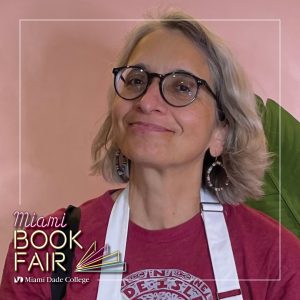
Boston-area native Erin Marcus’ path to becoming a doctor was somewhat circuitous. A history major who loved biology, she was a reporter for several newspapers in New England before heading to med school. Once there she kept her journalist skills sharp with stints as a science reporter in between semesters, and took a year off to be a reporter at The Washington Post. After graduation she did her residency at Georgetown University Hospital in Washington, D.C.
Today she’s a professor at the University of Miami and works with residents at UM/Jackson’s internal medicine program, where she weaves nonmedical texts into the curriculum. She and her husband have lived in Miami since 1996.
How did you end up in Miami?
My husband was offered a faculty position at the University of Miami School of Marine, Atmosphere and Earth Science, and as an M.D. I had much more flexibility than a Ph.D., so we came down here.
About your work, how do you throw literature into the mix?
I intentionally incorporate books and stories into the UM/JMH medicine residency program, and for the past six years have asked the incoming interns to read Edwidge Danticat’s memoir Brother, I’m Dying prior to arriving here. And Edwidge actually comes and speaks to the new interns on their first day of orientation. The goal is to improve their understanding of the Haitian immigrant experience, because as physicians in Miami they’ll be taking care of Haitian patients. I’ve also included writing by Roxane Gay in med student and resident sessions discussing the issue of obesity. There’s a lot of discrimination against people with obesity, and she speaks powerfully about her experiences.
That’s such a great approach.
I think literature – memoir in particular – is a useful tool for improving health workers’ empathy toward patients, and the residents and students have responded positively to that part of the curricula. I also encourage them to try to drop into the Fair if they’re off that weekend – it’s a nice break from the medical stuff!
Was Book Fair something you immediately took advantage of when you relocated to Miami?
We got here in late October 1996 and I remember going to Book Fair that year. It’s one of the best things – if not the best thing – about Miami.
How did you find out about it?
We would just look for things to do. The Fair was written up in the Herald and it was convenient because it was right downtown, so we went and it was great. We’ve pretty much gone every year since.
Tell me about the first program you saw.
I think the first Book Fair event I ever went to was a talk by Al Franken. We saw him and thought he was so funny; we’re fans of his humor. And then we went to Street Fair the following weekend.
Did you make going to the Fair a family affair?
Yes. They’re in college now, but from the time our kids were little we took them to Children’s Alley. We got photos with Clifford the Big Red Dog and some of the children’s authors and all that, and they still remember those things. My daughter loved meeting Raina Telgemeier – she was her favorite author at the time – and my son enjoyed a session with the Diary of a Wimpy Kid author and film cast. He also got to meet former M-DCPS Superintendent Rudy Crew, who wrote a nice inscription to him in his book, and former UM football coach Howard Schellenberger, who discussed his memoir. My son still talks about that. When my parents were alive I brought them to the Fair, too.
Are there any Fair events that stand out for you?
I’ve enjoyed some of the large sessions – such as those with Gore Vidal, Nora Ephron, Jane Mayer, April Ryan, David Wallace-Wells, and Rosie Perez and John Leguizamo, as well as the smaller sessions by authors like Nathan Connolly, who talked about his Miami history book A World More Concrete, and the legendary T.D. Allman, who discussed Finding Florida. The Fair has been a great way for me to learn about Miami and South Florida.
How long have you been a Friend?
Probably more than 20 years. It makes it easier to get in – you don’t have to stand in line, you just show your badge and go right on through. And I love the tote bags every year; I’ve gotten compliments on last year’s. I also think it’s important to support local activities that are good for the community.
What was the last great book that you read?
One that has really stuck with me, and I read it a few years after it had come out, is The Warmth of Other Suns: The Epic Story of America’s Great Migration by Isabel Wilkerson. I could not put it down. She tells that history in a very powerful way.
You’re on a deserted island – which three books do you have to have with you?
I would be practical and get a book on how to survive, like a book about poisonous plants, and then probably Song in a Weary Throat: Memoir of an American Pilgrimage by Pauli Murray or maybe On Writing by Stephen King. And One Hundred Years of Solitude by Gabriel García Marquez. But I think my first priority would be how to survive [laughs].
Interview by Elisa Chemayne Agostinho.
Responses edited for space and clarity.